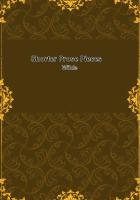This very day was the anniversary of the baron's death.
The baroness kept her room all the morning, and took no nourishment but one cup of spurious coffee Rose brought her.Towards evening she came down-stairs.In the hall she found two chaplets of flowers; they were always placed there for her on this sad day.She took them in her hand, and went into the little oratory that was in the park; there she found two wax candles burning, and two fresh chaplets hung up.Her daughters had been there before her.
She knelt and prayed many hours for her husband's soul; then she rose and hung up one chaplet and came slowly away with the other in her hand.At the gate of the park, Josephine met her with tender anxiety in her sapphire eyes, and wreathed her arms round her, and whispered, "But you have your children still."The baroness kissed her and they came towards the house together, the baroness leaning gently on her daughter's elbow.
Between the park and the angle of the chateau was a small plot of turf called at Beaurepaire the Pleasance, a name that had descended along with other traditions; and in the centre of this Pleasance, or Pleasaunce, stood a wonderful oak-tree.Its circumference was thirty-four feet.The baroness came to this ancient tree, and hung her chaplet on a mutilated limb called the "knights' bough."The sun was setting tranquil and red; a broad ruby streak lingered on the deep green leaves of the prodigious oak.The baroness looked at it awhile in silence.
Then she spoke slowly to it and said, "You were here before us: you will be here when we are gone."A spasm crossed Josephine's face, but she said nothing at the time.
And so they went in together.
Now as this tree was a feat of nature, and, above all, played a curious part in our story, I will ask you to stay a few minutes and look at it, while I say what was known about it; not the thousandth part of what it could have told, if trees could speak as well as breathe.
The baroness did not exaggerate; the tree was far older than even this ancient family.They possessed among other archives a manuscript written by a monk, a son of the house, about four hundred years before our story, and containing many of the oral traditions about this tree that had come down to him from remote antiquity.
According to this authority, the first Baron of Beaurepaire had pitched his tent under a fair oak-tree that stood prope rivum, near a brook.His grandson built a square tower hard by, and dug a moat that enclosed both tree and tower, and received the waters of the brook aforesaid.
At this time the tree seems only to have been remarked for its height.But, a century and a half before the monk wrote, it had become famous in all the district for its girth, and in the monk's own day had ceased to grow; but not begun to decay.The mutilated arm I have mentioned was once a long sturdy bough, worn smooth as velvet in one part from a curious cause: it ran about as high above the ground as a full-sized horse, and the knights and squires used to be forever vaulting upon it, the former in armor; the monk, when a boy, had seen them do it a thousand times.This bough broke in two, A.D.1617: but the mutilated limb was still called the knights'
bough, nobody knew why.So do names survive their ideas.
What had not this tree seen since first it came green and tender as a cabbage above the soil, and stood at the mercy of the first hare or rabbit that should choose to cut short its frail existence!
Since then eagles had perched on its crown, and wild boars fed without fear of man upon its acorns.Troubadours had sung beneath it to lords and ladies seated round, or walking on the grass and commenting the minstrel's tales of love by exchange of amorous glances.Mediaeval sculptors had taken its leaves, and wisely trusting to nature, had adorned churches with those leaves cut in stone.
It had seen a Norman duke conquer England, and English kings invade France and be crowned at Paris.It had seen a girl put knights to the rout, and seen the warrior virgin burned by envious priests with common consent both of the curs she had defended and the curs she had defeated.
Why, in its old age it had seen the rise of printing, and the first dawn of national civilization in Europe.It flourished and decayed in France; but it sprung in Gaul.And more remarkable still, though by all accounts it may see the world to an end, it was a tree in ancient history: its old age awaits the millennium; its first youth belonged to that great tract of time which includes the birth of Christ, the building of Rome, and the siege of Troy.
The tree had, ere this, mingled in the fortunes of the family.It had saved their lives and taken their lives.One lord of Beaurepaire, hotly pursued by his feudal enemies, made for the tree, and hid himself partly by a great bough, partly by the thick screen of leaves.The foe darted in, made sure he had taken to the house, ransacked it, and got into the cellar, where by good-luck was a store of Malvoisie: and so the oak and the vine saved the quaking baron.Another lord of Beaurepaire, besieged in his castle, was shot dead on the ramparts by a cross-bowman who had secreted himself unobserved in this tree a little before the dawn.
A young heir of Beaurepaire, climbing for a raven's nest to the top of this tree, lost his footing and fell, and died at its foot: and his mother in her anguish bade them cut down the tree that had killed her boy.But the baron her husband refused, and spake in this wise: "ytte ys eneugh that I lose mine sonne, I will nat alsoe lose mine Tre." In the male you see the sober sentiment of the proprietor outweighed the temporary irritation of the parent.Then the mother bought fifteen ells of black velvet, and stretched a pall from the knights' bough across the west side to another branch, and cursed the hand that should remove it, and she herself "wolde never passe the Tre neither going nor coming, but went still about." And when she died and should have been carried past the tree to the park, her dochter did cry from a window to the bearers, "Goe about!













